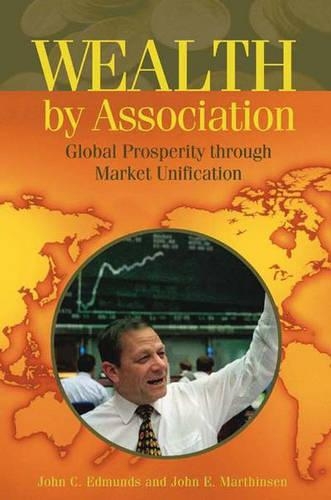
Wealth by Association: Global Prosperity through Market Unification
(Hardback)
Publishing Details
Wealth by Association: Global Prosperity through Market Unification
By (Author) John C. Edmunds
By (author) John Marthinsen
Bloomsbury Publishing PLC
Praeger Publishers Inc
30th March 2003
United States
Classifications
Tertiary Education
Non Fiction
339.3
Physical Properties
Hardback
264
Description
Demonstrates how and why wealth and growth materialize when financial markets unify by adopting a common currency. European monetary unification has produced a 15 trillion dollar windfall to its member nations that is rarely discussed or accounted for in analyses of economic integration. The authors argue persuasively that the reduction in cross-border risks--foreign exchange uncertainty, inflation differentials, competitive devaluations, and protectionism in financial services, among other risks--is directly responsible for an explosion in the value of fixed income assets and share prices. They go on to show how this wealth accumulation began to accrue even before the euro was formally adopted. Could the same thing happen in Latin America or Asia Elegantly written and cogently argued, this book explores the ramifications of currency unification for each region in three scenarios: partial unification, dollarization, and full unification. The authors compute the increases in wealth created by these various levels of currency unification, provide spreadsheet models that examine the connections between the growth of financial wealth and real economic growth, and emphasize differentials in economic wealth among regions with time series maps that "resize" nations according to equity markets rather than geography. As unlikely as a single currency for Asia or Latin America may seem, it was once deemed almost as unlikely that the euro would reign unchallenged in Europe. On January 1, 2002, merely three years after its adoption, the euro officially replaced the national currencies of 12 members of the European Union. Eleven years earlier, few predicted that the unheralded Maastricht Treaty, which established the criteria for membership in the European Monetary Union, would be signed, let alone that it would lead to the historically unprecedented step of abolishing the currencies of 12 major countries. At every step, fears dominated the discussions of currency unification because many nations were reluctant to give up their monetary autonomy. Nevertheless, the benefits of unification prevailed. Such benefits need not be confined to Europe. The authors employ methodological analyses and develop step-by-step illustrations to show that the wealth-generating effects of currency unification could be felt by as few as two or three nations that agree to unify; those benefits, in turn, act as a magnet to draw in other countries, and the entire snowball effect begins in earnest. In addition to the incentives to unify, there are distinct financial disincentives to remain outside the circle as more and more neighboring countries join. This book is not about free trade or the glories of unrestricted capital flows. Instead, it is about how the unification of financial markets can lead concurrently to growth in real GDP. In the present era of supranational management, currency unification is more feasible than ever before because the combined efforts of nations can better resist the effects of international capital flows. Unification can also counteract the vagaries of national politics as the union's commitment to price stability takes precedence.
Author Bio
JOHN C. EDMUNDS is Director of the Stephen D. Cutler Investment Management Center at Babson College. He is also on the faculty of the Arthur D. Little School of Management in Chestnut Hill, Massachusetts. JOHN E. MARTHINSEN is the Distinguished Chair in Swiss Economics of the Glavin Center for Global Entrepreneurial Leadership at Babson College.
